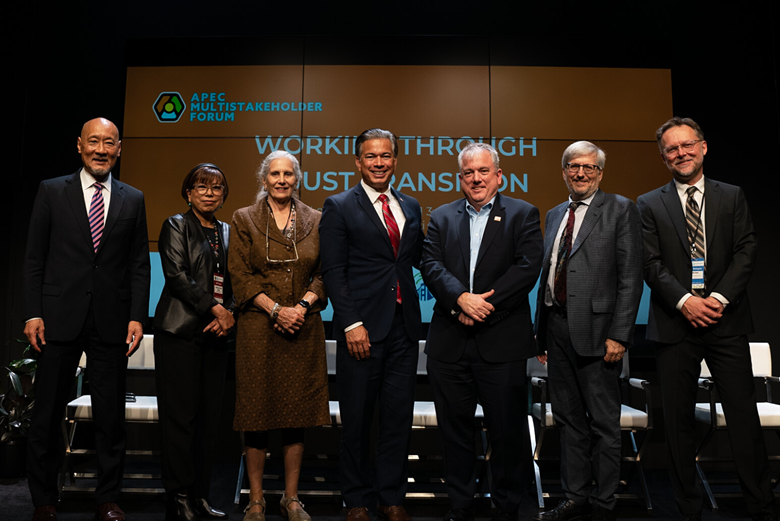Pioneering Multistakeholder Forum Drives Inclusive, Collaborative Solutions for Just Transition

The APEC Multistakeholder Forum raises the curtain on the 2023 APEC Economic Leaders’ Week in San Francisco. In a groundbreaking initiative to address the local impact of climate change and just transition on the region’s diverse communities including leaders from various civil society organizations, Indigenous Peoples, youth, workforce, and women’s groups gather to foster collaboration and dialogue.
The objective of the forum was clear: to highlight community level interventions that take into account the needs of these vulnerable groups during the global shift toward net zero carbon economies.
One of the critical issues facing vulnerable communities around the world is their limited representation in climate policy dialogues and decision-making processes. Groups with untapped economic potential often bear the highest cost (in terms of loss and damage) when it comes to the growing number of climate events around the world.
“Although the impact of climate change affects everyone, it does not affect all communities equally. Some in the APEC region—often those who have not historically had opportunities to participate in making decisions to address the climate crisis—experience greater suffering.” said Ambassador Matt Murray, United States’ Senior Official for APEC, as he addressed participants of the forum.
“We have a responsibility to actively engage with diverse voices and perspectives in climate discussions,” he added. “However, this is not just the right thing to do. It is also the most effective way to do it. By bringing all groups’ unique experiences and knowledge to the table, we can find the most effective solutions for climate adaptation and mitigation for all.”
“The Pacific basin is our common home. It ties us together through trade, identity, the movement of people, our security, our common environment, and especially to meet the challenges of climate change. It necessitates that we work together throughout this region for a zero-carbon future,” said Dr Gloria Duffy, Co-President and CEO of Commonwealth Club World Affairs.
APEC economies are wrestling with the broad and complex structural reform challenge of decarbonizing the world’s supply chains, energy supplies, and transportation systems. The need to address the local impact of this transition on the region’s diverse communities from a grassroot perspective is a matter of growing urgency.
Preparing workforce participants for new sustainable jobs will require new human capital development strategies that account for local contexts. Retraining and certification programs will also need to be established to fit the market. At the same time, social protection schemes will need to extend to vulnerable populations.
“In the post-COVID world, it's time to find a new way of doing things. We can no longer do business as usual,” said Philip Yun, Co-President and CEO of Commonwealth Club World Affairs.
The AMF underscored the urgent need for collective action to address climate challenges. Discussions centered on promoting sustainable practices to emphasize the importance of fostering social equity and inclusion.
“The US as host of APEC is advancing work on just energy transition, moving us to a low carbon economy while promoting equity and inclusivity. APEC has some policy options, spanning support for access to decent work to comprehensive structural reforms, to ensure that we have policies that promote sustainable practices and social safety nets,” said Dr Rebecca Sta Maria, APEC Secretariat Executive Director.
“Having dialogues like this provides a platform for stakeholders to discuss inclusion, specifically for the underrepresented groups or groups made vulnerable by the energy crisis and technological and climate change readiness,” she added.
“This forum is a great platform to reaffirm our commitment to cooperating with civil society stakeholders on just transition topics. It enhances the important progress made by our predecessors in furthering APEC efforts to include key non-governmental stakeholders, as outlined in the Putrajaya Vision 2040 and Aotearoa Plan of Action, and APEC’s broader sustainability agenda, as defined by the 2022 Bangkok Goals,” concluded Ambassador Murray.
The APEC Multistakeholder Forum was organized by the Commonwealth Club World Affairs with the support of the US Department of State and the APEC Secretariat. From 10-13 November, key topics at the forum include: community level action; Indigenous Peoples’ transition experience; voices of youth; public-private partnerships; and innovative low-carbon solutions that are inclusive.
For further details and media inquiries, please contact:
[email protected]

